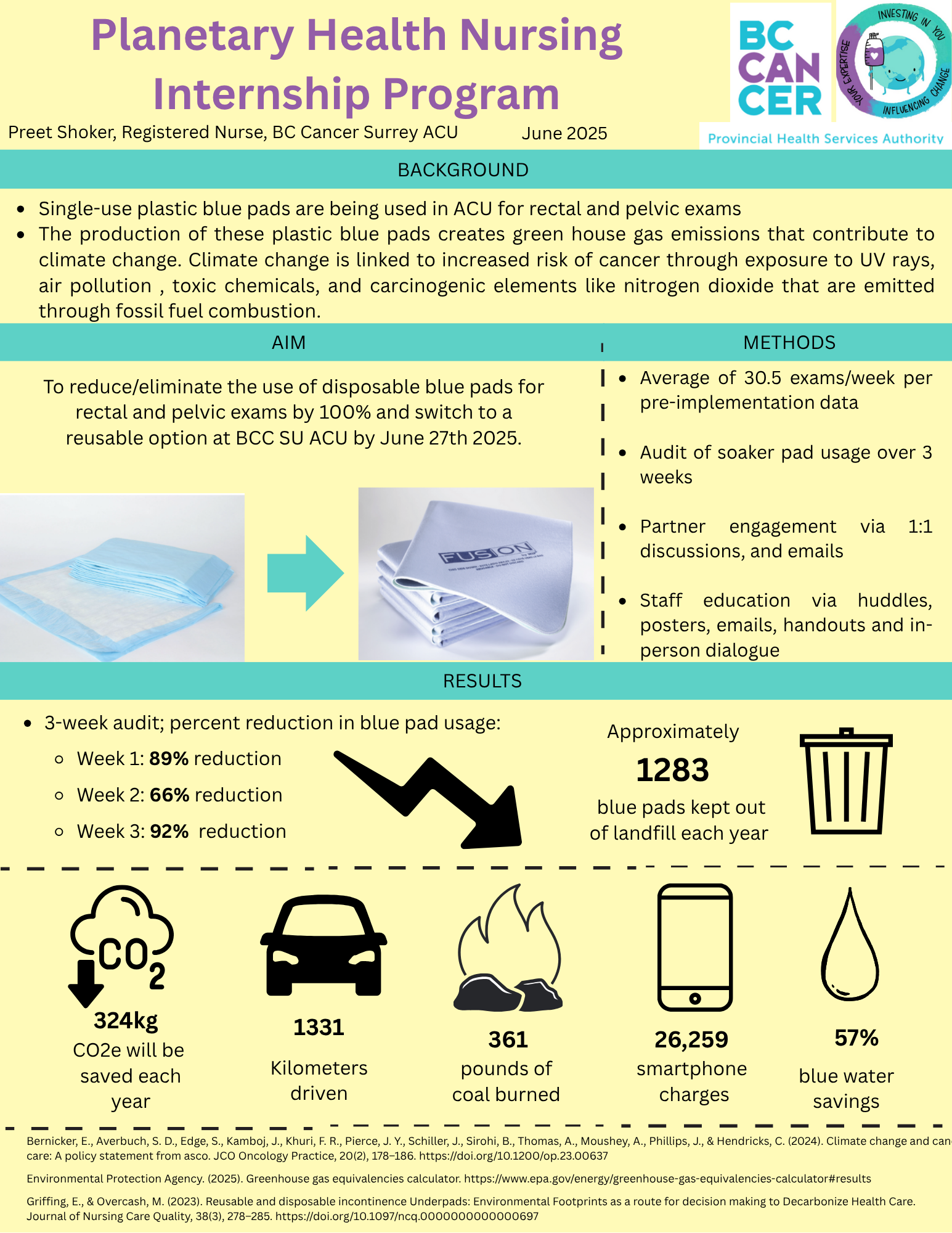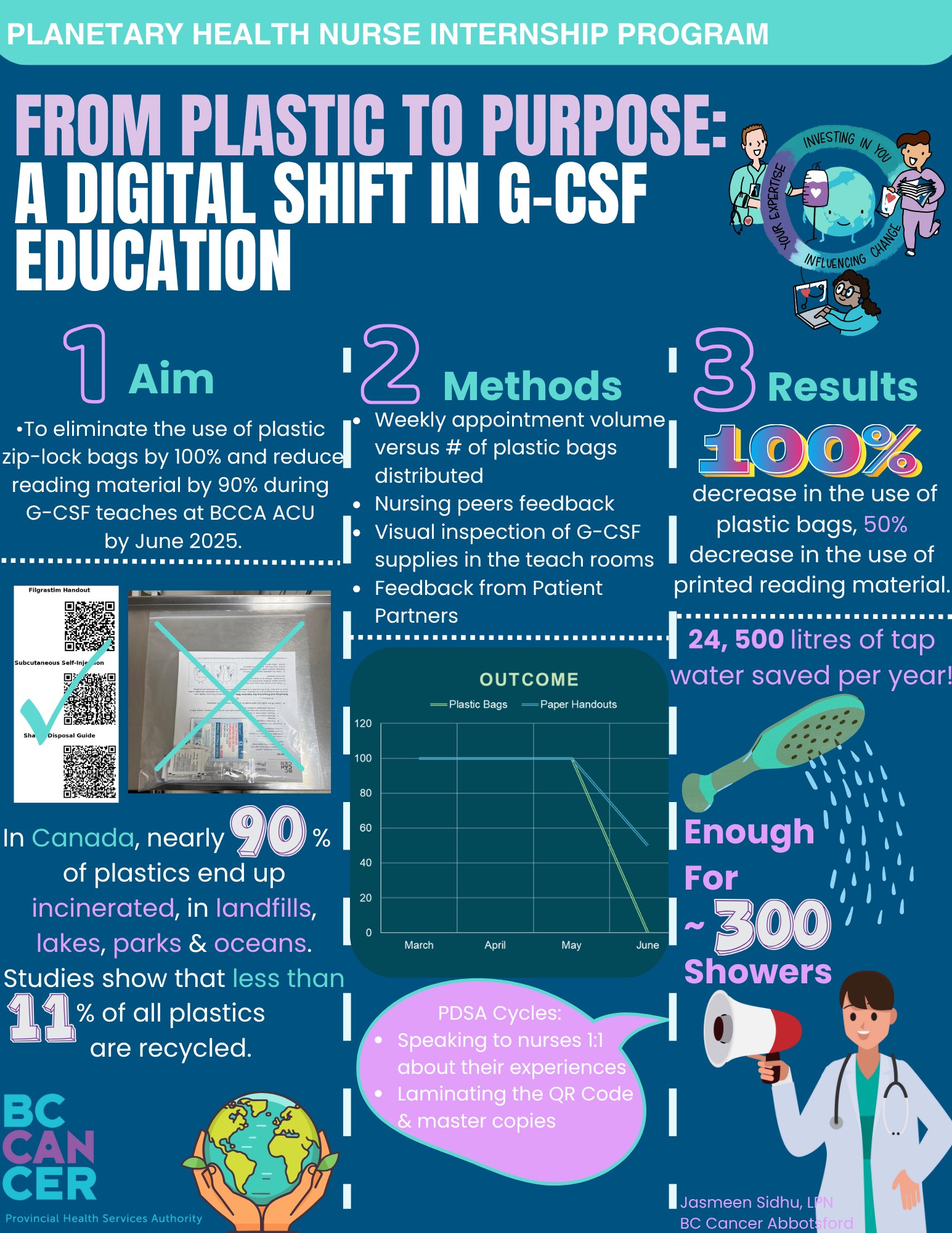The BC Cancer Planetary Health Nursing Internship Program, part of the Department of Nursing and Allied Health Research and Knowledge Translation, integrates planetary health principles into nursing practice. Nurses have undertaken innovative research, exploring the vital connections between environmental sustainability, patient care, and community health. Their efforts highlight the critical role of nurses in promoting a healthier, more sustainable future.
Planetary Health Nursing Internship Program Projects
2024 Cohort #1
Project #1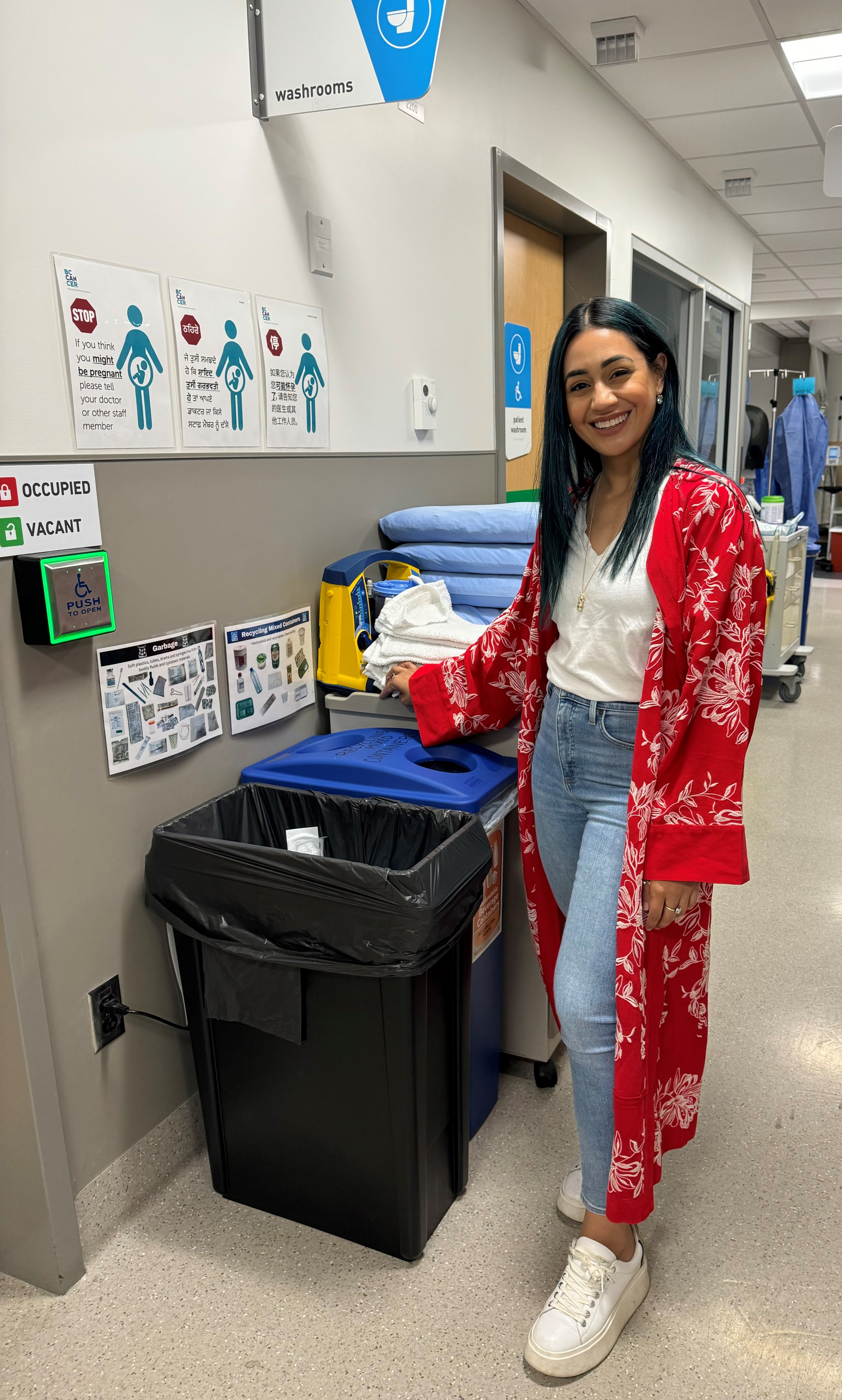 Project Lead: Nisha Mattu (BC Cancer Surrey)Background: All packaging and waste in systemic therapy is disposed of in the garbage, ultimately ending up in the landfills. This causes high waste management costs and landfill waste emits harmful greenhouse gas emissions that pose a risk to human and environmental health. Project Aim: To increase recycling bins in the clinical setting by 80% in 4 weeks. Outcome & Environmental Impact: 49% of waste generated in systemic therapy is now recycled, reduced from 100% over a few weeks. This has resulted in reducing the demand on landfill space and waste treatment technologies, reducing the release of pollutants that harm human health, and lowering the amount of micro-plastics entering the environment. |
Project #2Be Rad Avoid The Pad Project - Infographic Project Lead: Brighdie Davey (BC Cancer Prince George)Background: Prior to project launch on May 6, 2024, approximately 2500 disposable blue pads per year were used for IV prewarming hotpacks resulting in a carbon footprint (measured in Global Warming Potential, or GWP) of 1,037.5 kg C02 eq or equivalent to 442 L gasoline consumed from just the Chemo Room. BC Cancer Prince George treats 75% less patients than some other larger centers meaning there is great potential of this project to have a significant impact if expanded provincially. Project Aim: Decrease the use of disposable plastic absorbent pads for moist heat warming prior to peripheral intravenous cannulation at BC Cancer Prince George by 80% by August 2024. Outcome & Environmental Impact: This project reduced overall use or disposable pads in the chemo room by 85%, a monthly overall average of 86 kg CO2 in blue pads reduced to 13 kg C02. |
Project #3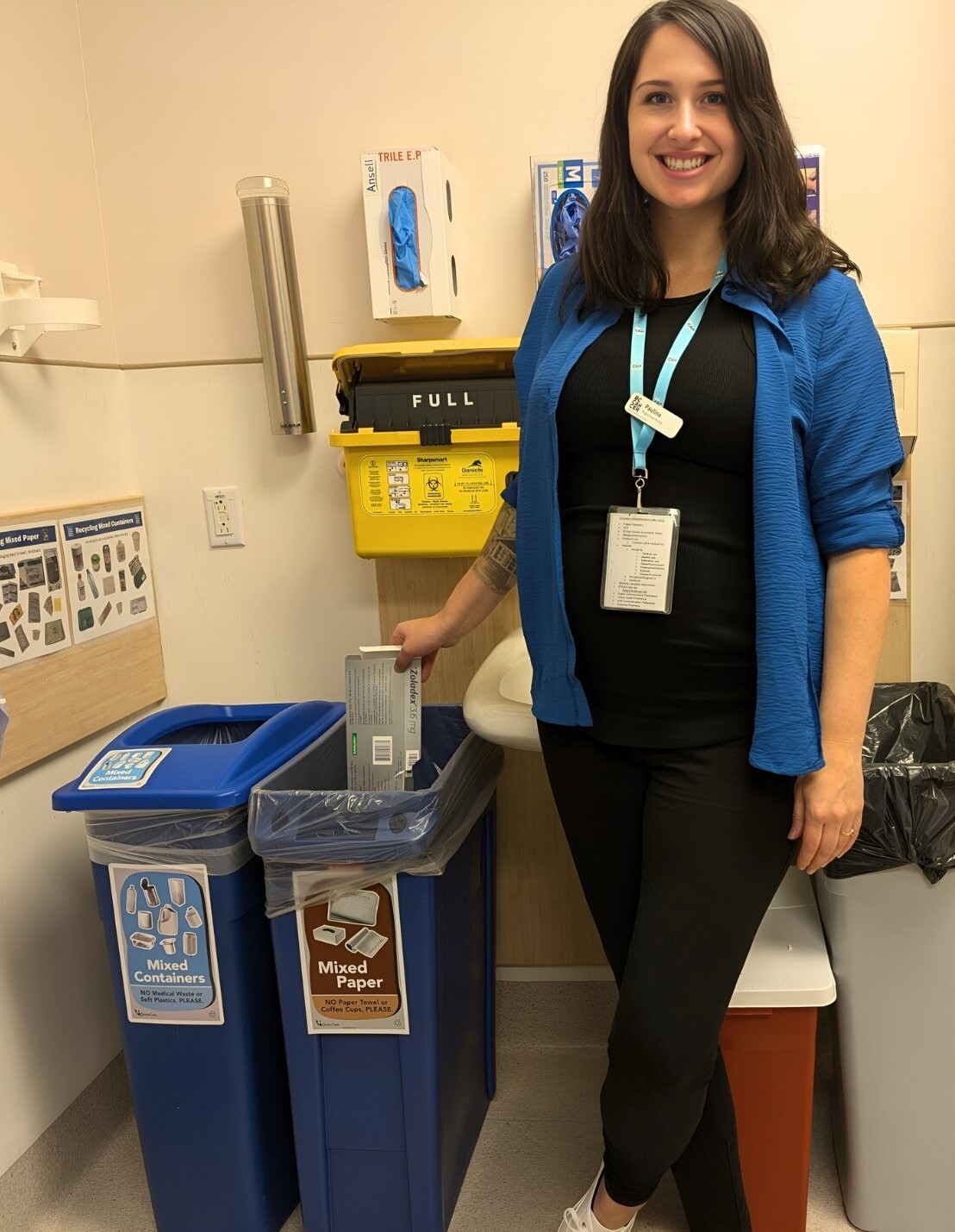 Recycling and Waste Reduction at BC Cancer Abbotsford in ACU - Infographic Project Lead: Paulina Batke (BC Cancer Abbotsford)Background: The ACU clinics at BC Cancer Abbotsford had three rooms that did not have any recycling bins in place, including two nursing task rooms and the supply/medication room. These areas produce waste including hard plastic, paper & boxboard items. These items contribute to our greenhouse gas (GHG) emissions when biodegrading in the landfill and producing methane. Project Aim: To reduce the amount of recyclable material going into the landfill. Outcome & Environmental Impact: Recycling bins were added to ACU, posters were created as a visual aid and staff received education about recycling. 5 days after the bins were placed, there was an 80% decrease of recyclable items in the garbage, sustained over 4 weeks with an overall decrease of 83%. |
Project #4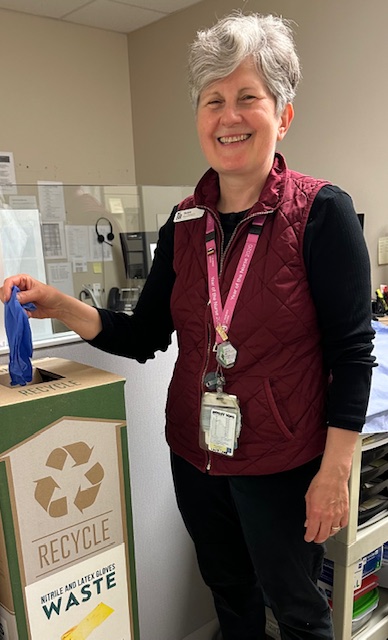 Project Lead: Nancy (Surya) Absolon (BC Cancer Vancouver)Background: The health care sector is a significant contributor to industrial waste in Canada. This has serious implications for human health, green house gas emissions, and even the psychological wellbeing of health care workers. Single-use, non contaminated gloves are a high contributor to medical waste . A single nitrile glove (~3.2g) has a carbon footprint of 26g CO2e, and may take over 100 years to decompose in a landfill. Project Aim: Introduce a purpose-built recycling box for non-contaminated single-use gloves to decrease the proportion of gloves sent to landfill. Outcome & Environmental Impact: The majority of gloves used in the BC Cancer Vancouver Centre units were non-contaminated and eligible to be recycled (over 90%). Over the duration of the project, 247 gloves were diverted from landfill. The uptake in practice change by staff who are willing to disrupt the production of medical waste indicates that the recycling boxes may be successful if expanded to other areas of Vancouver Centre. |
2024 Cohort #2
Project #1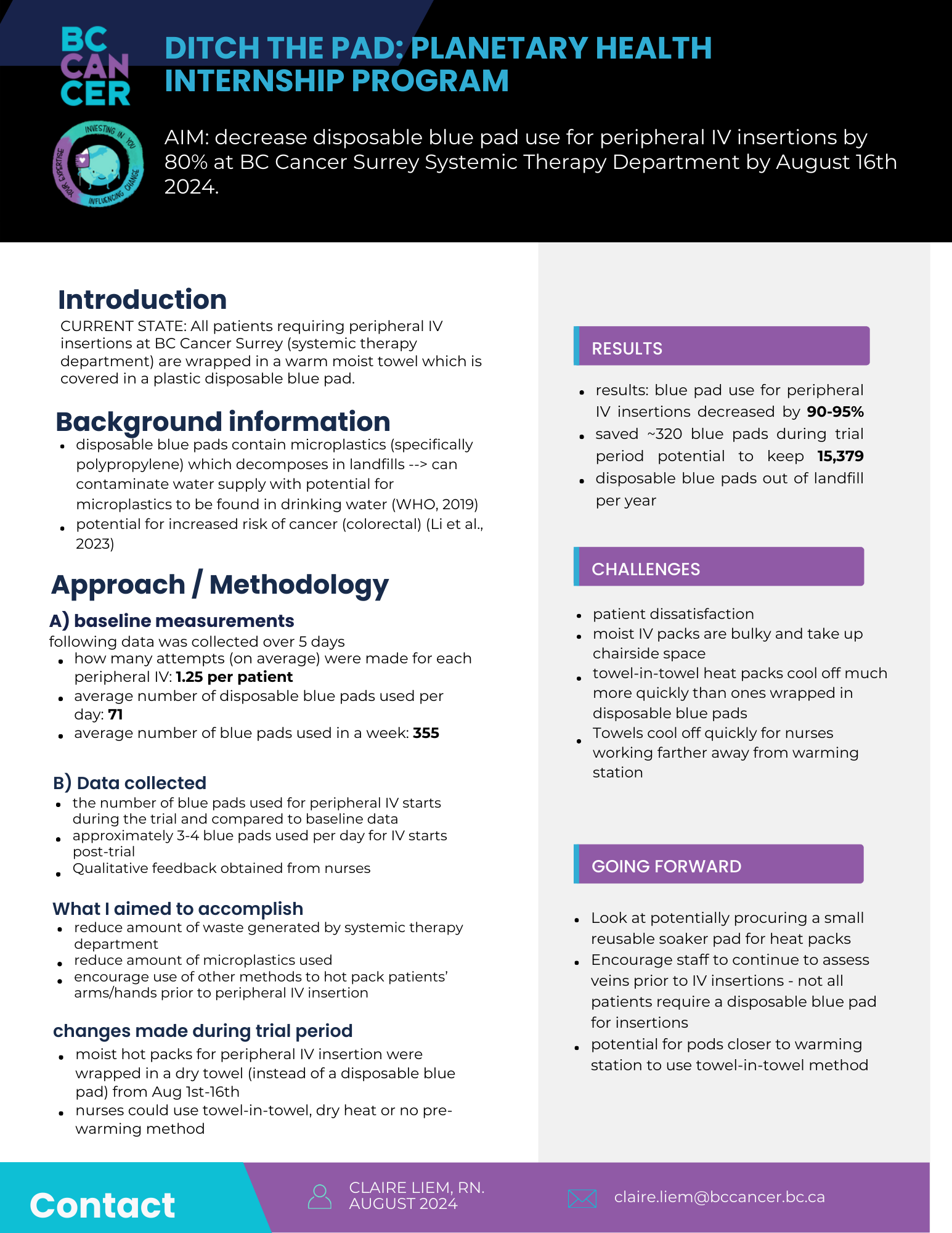 Ditch the Blue Pad: A Planetary Health Initiative - Infographic Project Lead: Claire Liem (BC Cancer Surrey)Background: All patients requiring peripheral IV insertions at BC Cancer Surrey (systemic therapy department) are wrapped in a warm moist towel which is covered in a plastic disposable blue pad. Disposable blue pads contain microplastics (specifically polypropylene), which breakdown in landfills and can contaminate our water supplies, with data showing that microplastics found in drinking water may be linked to an increased risk of cancer. Project Aim: Decrease disposable blue pad use for warm moist peripheral IV starts by 80% at BC Cancer Surrey Systemic Therapy department by August 15, 2024. Outcome & Environmental Impact: Blue pad use for peripheral IV insertions decreased by 90-95%, saved ~320 blue pads during trial period, and potential to keep 15,379 disposables blue pads out of landfill per year. Alternatively, dry heat methods were used for peripheral IV starts, which do not require disposable blue pads. |
Project #2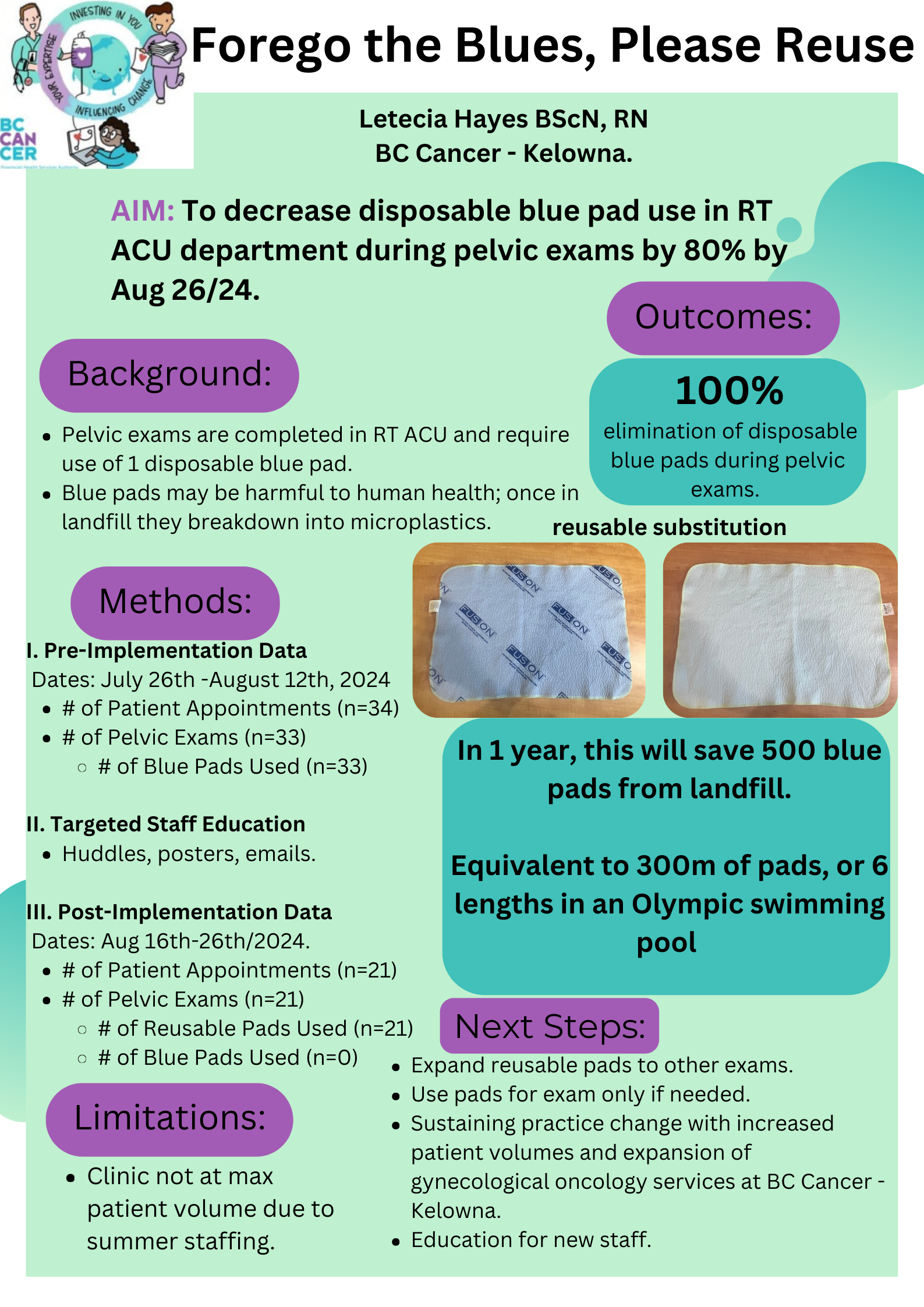 Forgo the Blue, Please Reuse - Infographic Project Lead: Letecia Hayes (BC Cancer Kelowna)Background: Pelvic Exams are commonly completed in RT ACU with an average of 1 blue pad used per exam. These disposable blue pads contain polypropylene plastic. Some studies show microplastics may cause chronic lung inflammation and increase risk of lung cancer and inflammation to GI tract, as well as being major contributors to environmental degradation. Project Aim: Decrease blue pad use from pelvic exams in RT ACU department by 80% by Aug 26, 2024, transition to reusable pads. Outcome & Environmental Impact: This project saw a 100% reduction in disposable blue pad use during pelvic exams. The alternative product, reusable linen pads, have a considerably smaller environmental impact without compromising patient care. Reusable pads require significantly less use of non-renewable energy and water during the product lifetime. They also produce 60% less C02e emissions than disposable pads. |
Project #3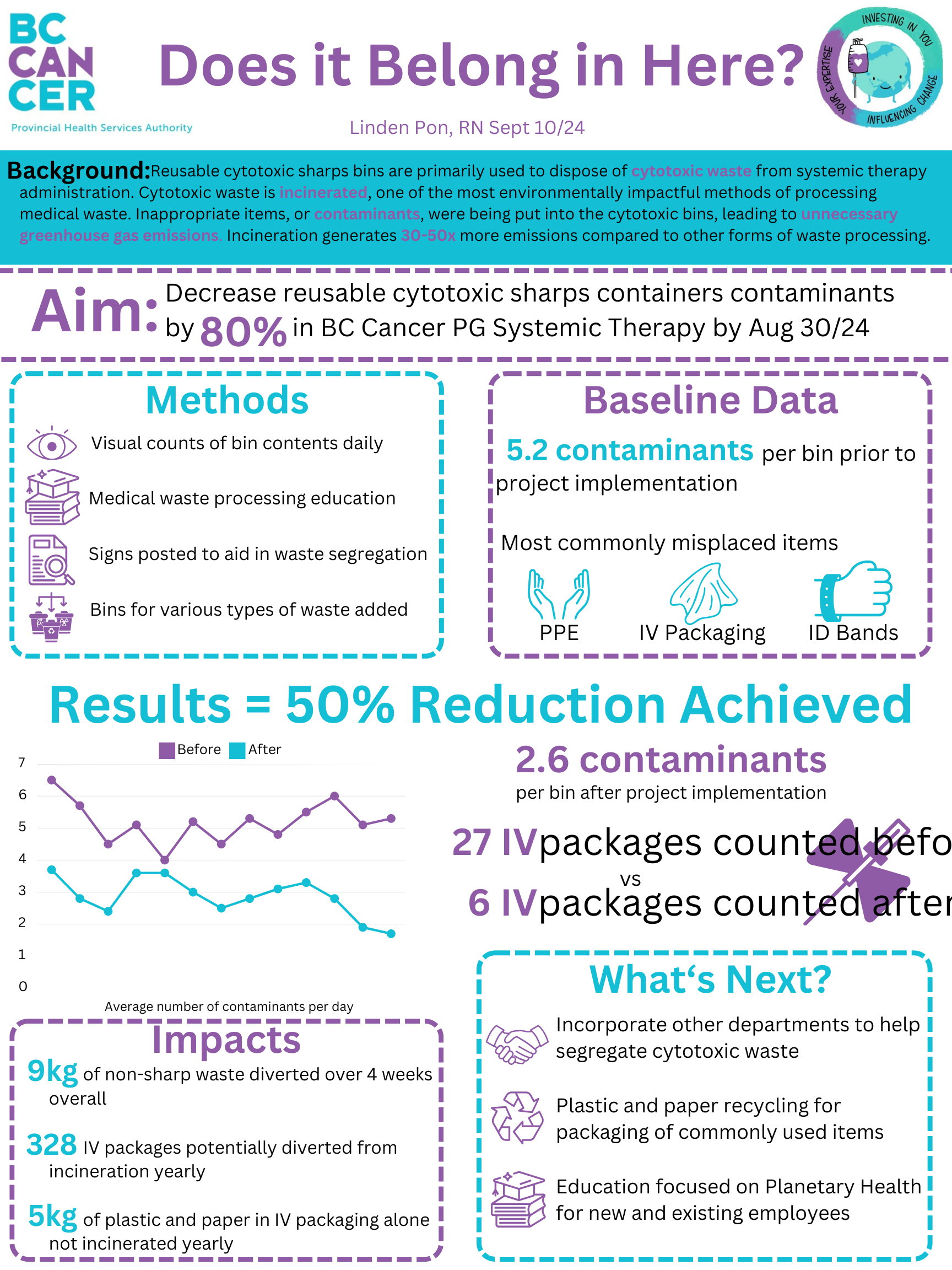 Does it Belong in Here? - Infographic Project Lead: Linden Pon (BC Cancer Prince George)Background: Reusable cytotoxic sharps bins are primarily used to dispose of cytotoxic waste from systemic therapy administration. Cytotoxic waste is incinerated, one of the most environmentally impactful methods of processing medical waste, generating 30-50x more emissions compared to other forms of waste processing. Inappropriate items, or contaminants, were being put into the cytotoxic bins, leading to unnecessary greenhouse gas emissions. Project Aim: Decrease reusable cytotoxic sharps containers contaminants by 80% in BC Cancer Prince George Systemic Therapy by August 30, 2024. Outcomes & Environmental Impact: 50% reduction achieved; an average of 2.6 contaminants per bin per day. 9kg of non-sharp waste diverted over 4 weeks overall, with the potential to divert 5kg of plastic and paper in IV packaging alone from incineration annually. This reduction in cytotoxic waste contaminants will decrease the emissions of incinerated cytotoxic waste produced by BC Cancer Prince George. |
Project #4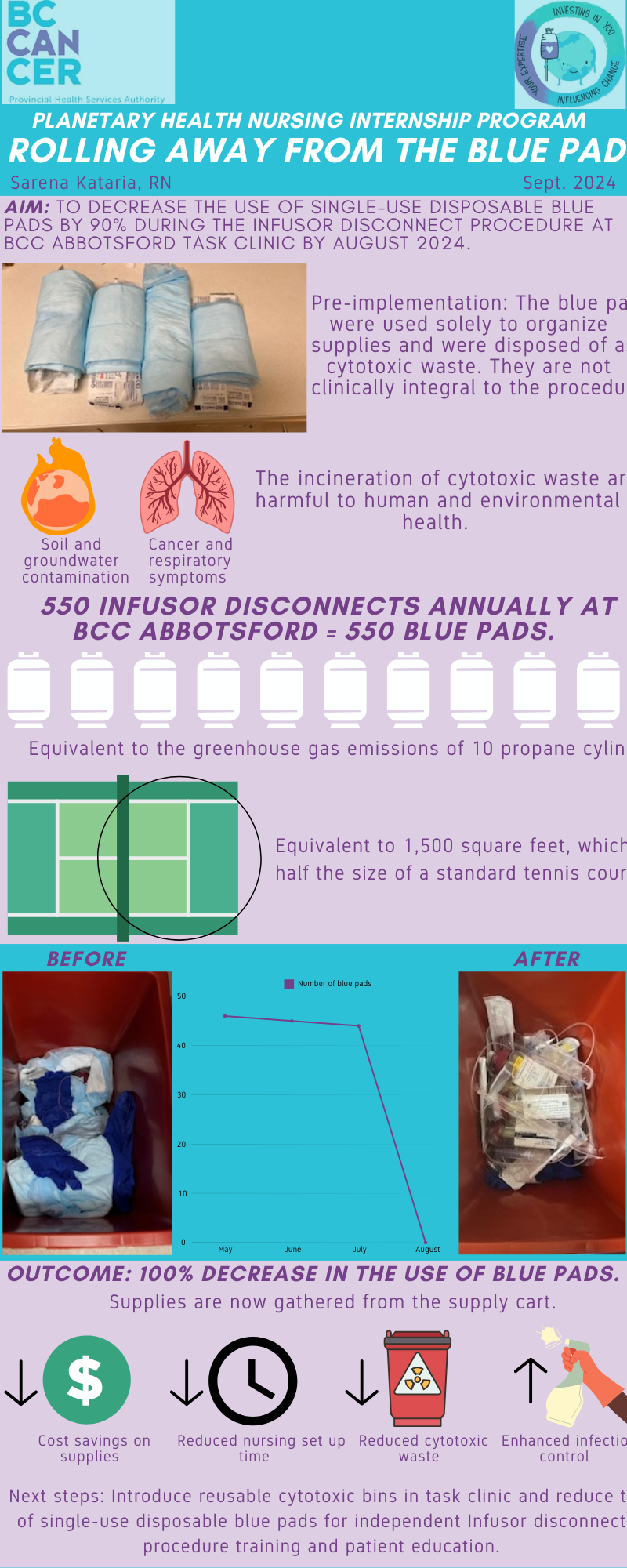 Rolling Away from the Blue Pad - Infographic Project Lead: Sarena Kataria (BC Cancer Abbotsford)Background: Disposable blue pads were used as an organizational tool to roll up the supplies needed for the Infusor Disconnect procedure; the blue pads were not essential to the procedure. Project Aim: To decrease the use of single use disposable blue pads by 90% during the Infusor Disconnect procedure at BC Cancer Abbotsford Task Clinic by August 2024. Outcomes & Environmental Impact: 100% decrease in the use of blue pads for Infusor Disconnect procedures in Task Clinic. The benefits of eliminating the blue pad for this procedure include cost savings on supplies, enhanced infection control, reduced cytotoxic waste, reduced nursing set up time, and safer medication practice. |
Project #5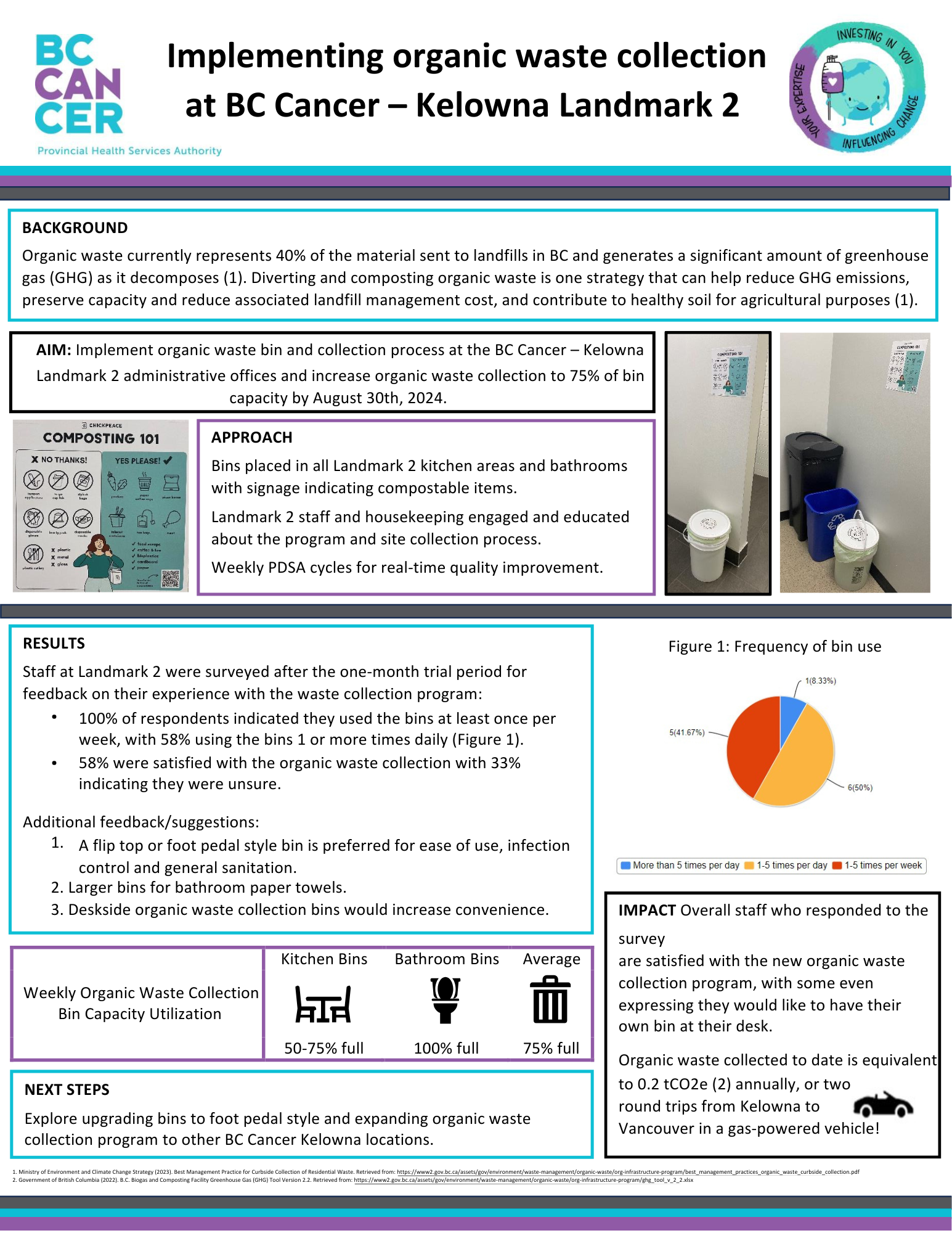 Implementing Organic Waste at BC Cancer - Infographic Project Leader: Andrea Knox (BC Cancer Kelowna)Background: Organic waste currently represents 40% of the material sent to landfills in BC and generates a significant amount of greenhouse gas (GHG) as it decomposes. Diverting and composting organic waste is one strategy that can help reduce GHG emissions, preserve capacity and reduce associated landfill management cost, and contribute to healthy soil for agricultural purposes. Project Aim: Implement organic waste bin and collection process at the BC Cancer – Kelowna Landmark 2 administrative offices and increase organic waste collection to 75% of bin capacity by August 30th, 2024. Outcome & Environmental Impact: Staff at Landmark 2 were surveyed after the one-month trial period for feedback on their experience with the waste collection program: • 100% of respondents indicated they used the bins at least once per week, with 58% using the bins 1 or more times daily (Figure 1). • 58% were satisfied with the organic waste collection with 33% indicating they were unsure |
2024 Cohort #3
Project #1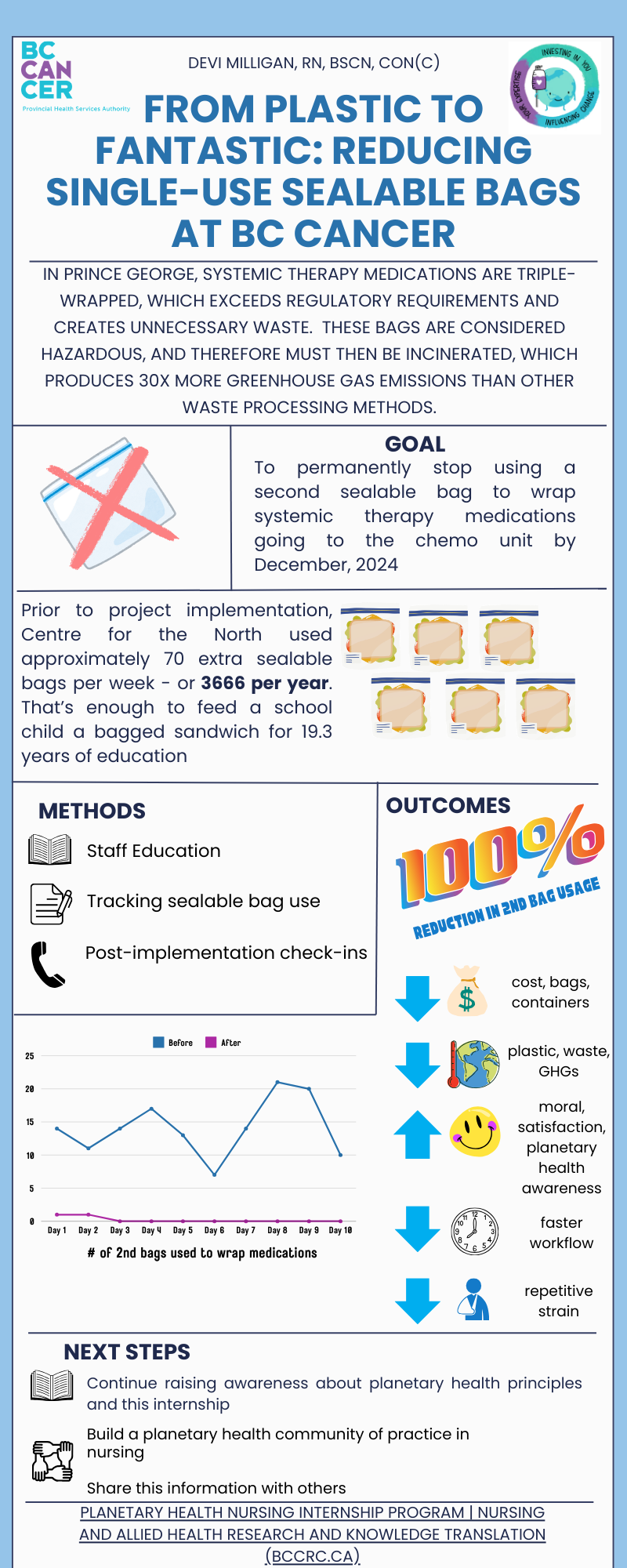 From Plastic to Fantastic: Reducing Single-Use Ziplock Bags at BC Cancer - Infographic Project Lead: Devi Milligan, RN, CON(C)Background: In Prince George, systemic therapy medications are triple wrapped, using double bagging and a reusable plastic box, which exceeds regulatory requirements and creates unnecessary waste. These bags are considered hazardous, and therefore must then be incinerated, which produces 30X more greenhouse gas emissions than other waste processing methods. Prior to project implementation, Centre for the North used approximately 70 plastic bags per week (or 3666 bags per year) as the second layer of plastic. Project Aim: Permanently stop using a second sealable plastic bag to wrap systemic therapy medications going to the chemo unit by December 2024. Outcome & Environmental Impacts: 100% reduction in 2nd bag usage over a 12 week period. Reduced costs for bags, waste containers, and incineration. Less plastic waste being incinerated, decreasing the GHG emissions. Faster workflow for pharmacy staff with less repetitive strain, decreasing the chance of workplace injuries. Increased staff morale and satisfaction from supporting environmental goals. Increased planetary health awareness and strengthened team connections. |
Project #2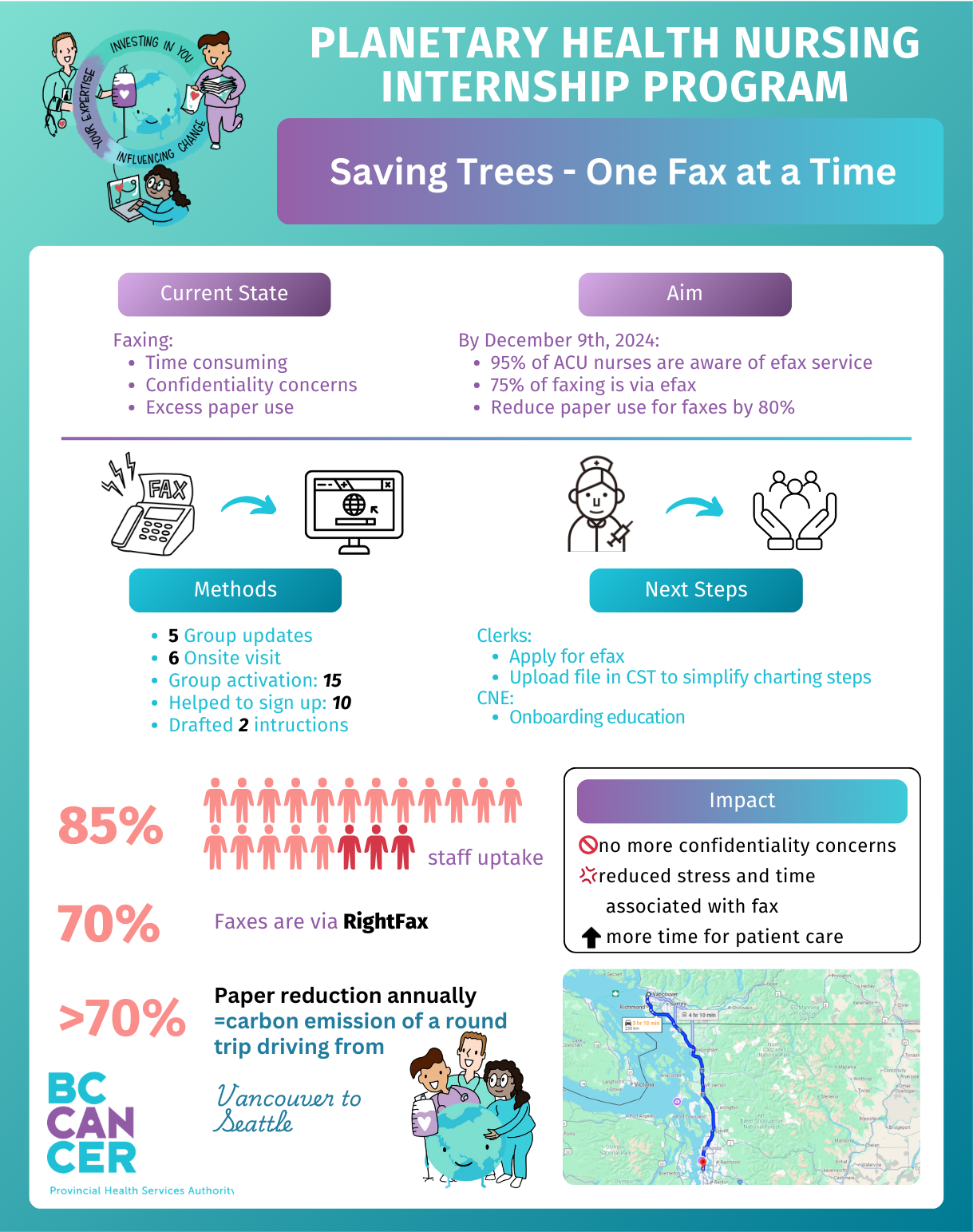 Saving Trees – One Fax at a Time - Infographic Project Lead: Haiying She, RNBackground: Currently, traditional faxing via fax machine is time-consuming, uses excess amounts of paper, and may present confidentiality concerns. Project Aim: By December 9th, 2024, 95% of ACU nurses are aware of eFax service, 75% of faxing via eFax and fax paper use is reduced by 80%. Outcomes & Environmental Impact: 85% of staff have access to eFax, 70% of faxes are via RightFax, and 70% paper reduction annually. Reduction of confidentiality concerns, reducing stress and time associated with faxing, and more time for patient care. |
Project #3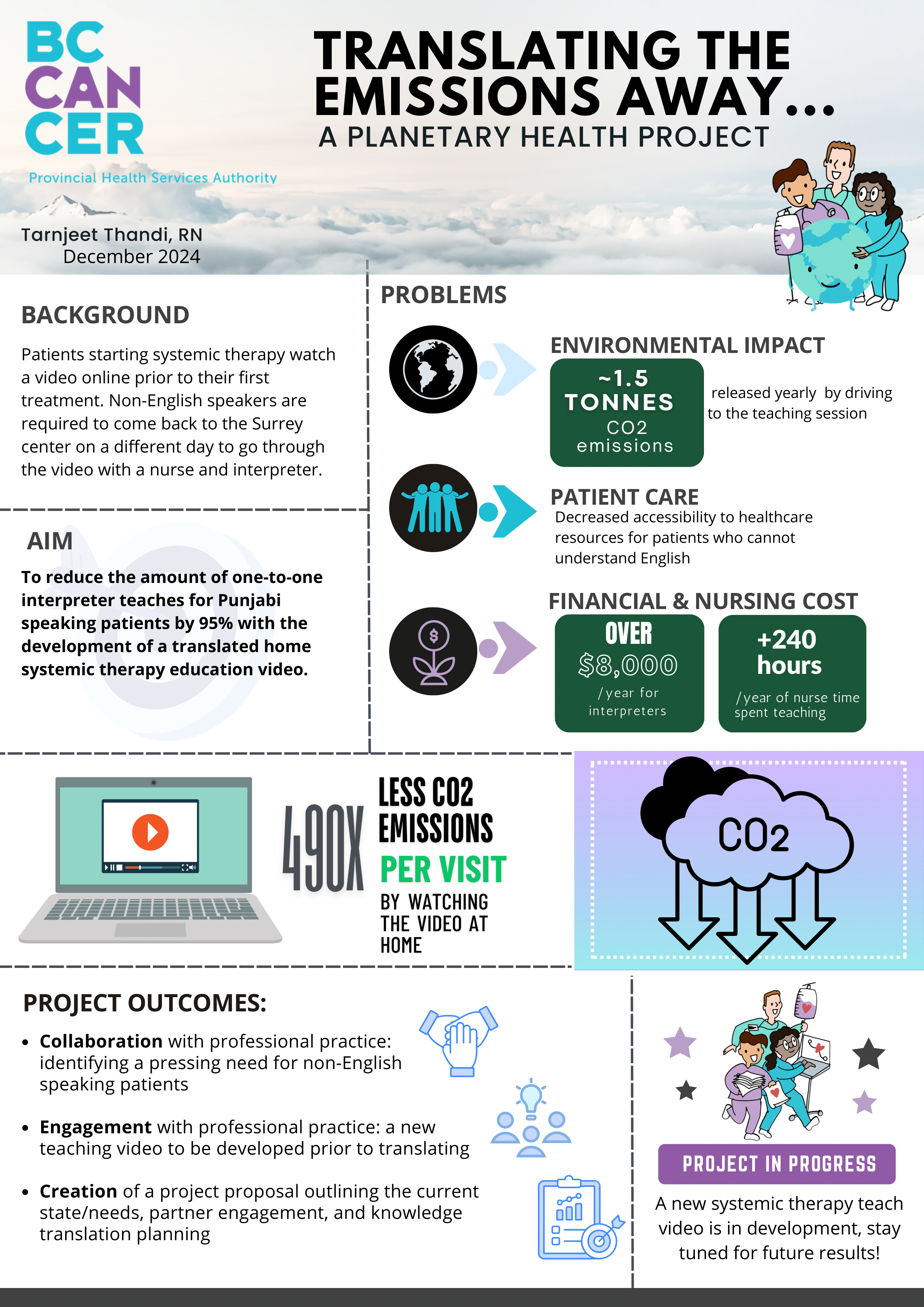 Translating the Emissions Away - Infographic Project Lead: Tarnjeet Thandi, RNBackground: Patients starting systemic therapy watch a video online prior to their first treatment. Non-English speakers are required to come back to the Surrey center on a different day to go through the video with a nurse and interpreter. Project Aim: To reduce the amount of one-to-one interpreter teaches for Punjabi speaking patients by 95% with the development of a translated home systemic therapy education video. Outcome: Collaboration with professional practice in identifying a pressing need for translated resources for non-English speaking patients. Engagement with professional practice: the team has prioritized a new teaching video to be developed prior to translating. A detailed project proposal was created outlining the current state/needs, benefits, partner engagement, and knowledge translation planning. |
Project #4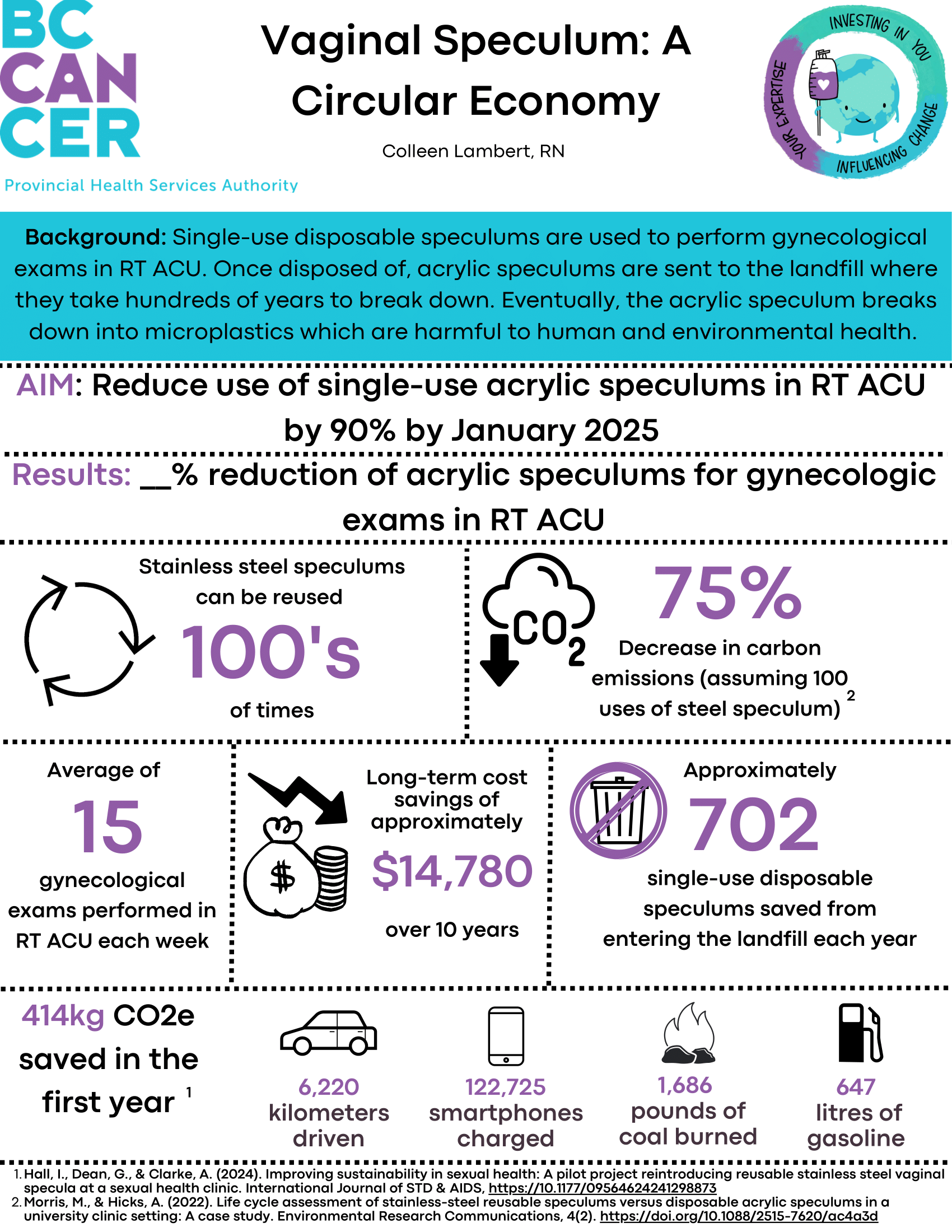 Vaginal Speculum: A Circular Economy - Infographic Project Lead: Colleen Lambert, RNBackground: Single-use disposable speculums are used to perform gynecological exams in RT ACU. Once disposed of acrylic speculums are sent to the landfill where they take over 200 years to break down. Eventually, the acrylic speculum breaks down into microplastics which are harmful to human and environmental health. Acrylic is composed of polymethyl methacrylate (PMMA), PMMA accumulates in tissues within the body. This leads to chronic inflammation, which increases the risk of cancer. Project Aim: Reduce use of single-use acrylic speculums in RT ACU by 90% by January 2025. Outcome: Implementation is currently ongoing, additional data will be released when available. |
2025 Cohort #1
Project #1
A Greener Approach to Port/IVAD Access Infographic Project Lead: Fanny Ma (BC Cancer Vancouver) Background: At BCCVA-ACCU, accessing PORTS/IVADS for systemic therapy requires opening a full dressing tray- mainly to access its sterile wrapper. Most supplies inside go unused and are incinerated. This contributes to greenhouse gas emissions, air pollution and environmental harm. Reducing unnecessary waste aligns with planetary health goals, protecting both the environment and patient well-being. Project Aim: To reduce waste by 90% from unused materials in single-use dressing trays used for PORT/IVAD access at BC Cancer Vancouver ACCU. Outcome: 94% reduction of waste achieved through: highlighting sterile glove wrapper method and replacing dressing trays with sterile drapes. |
Project #2
Disconnect Kit Changes- Cut the plastic, Keep the Planet Project Lead: Mackenzie Kronemeyer (BC Cancer Prince George) Background: Disconnect kits are prepared for patients to take home to independently disconnect their 5FU infusor bottles. In Prince George systemic therapy, unnecessary plastic bags and blue pads were being used to prepare these kits. These plastics are not required as per BC Cancer guidelines and contribute to our waste production and costs. Project Aim: To permanently eliminate the use of large plastic bags and blue pads from the disconnect kits prepared in Prince George BC Cancer by 100% by March 2025. Outcome: 100% elimination of excess plastics in disconnect kits. |
2025 Cohort #2
Project #1
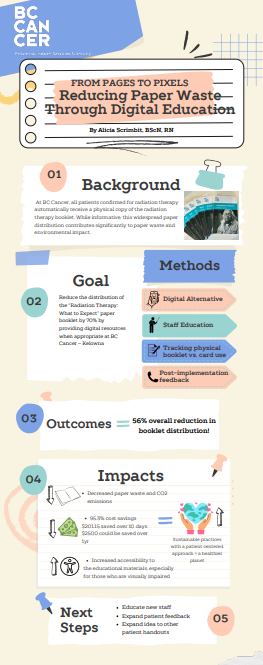 | From Pages To Pixels: Reducing Paper Waste Through Digital EducationProject Lead: Alicia Scrimbit (BC Cancer Kelowna) Background: The distribution of paper radiation therapy booklets to every patient receiving radiation therapy generates significant paper waste, contributing to negative environmental impact Project Aim: By June 2025, reduce the distribution of the “Radiation Therapy: What to Expect” paper booklet by 70% by providing digital resources when appropriate at BC Cancer – Kelowna. Outcome: 56% overall reduction in booklet distribution | |
Project #2
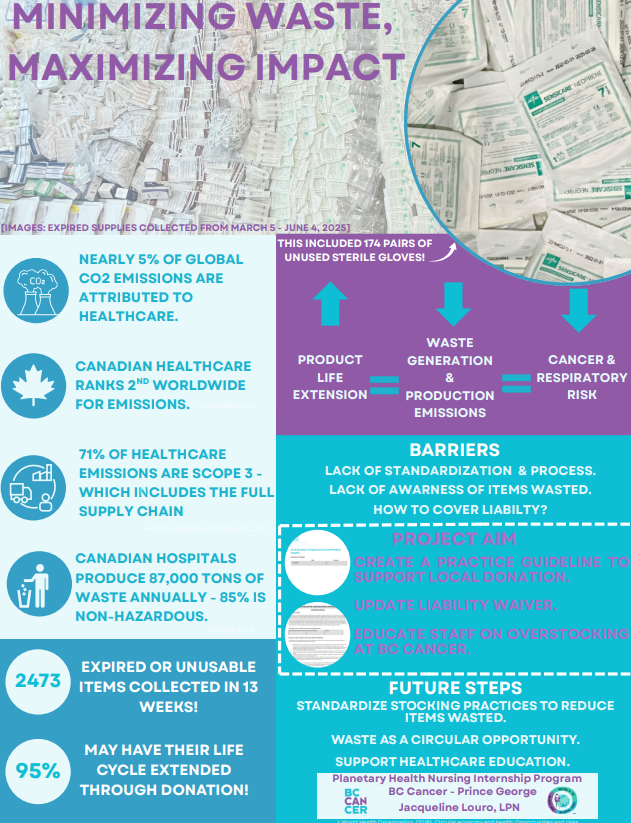 | Minimizing Waste, Minimizing ImpactProject Lead: Jacqueline Louro (BC Cancer Prince George) Background: Expired, unused products going into the garbage monthly. PHSA and BC Cancer does not have a policy to support, track amount, or cover liability of supply donation. Project Aim: To create a SHOP guideline for BC Cancer - Centre for the North to support local donation of expired, unused items from BCC PG to be submitted for approval by Policy Management before June 27, 2025. Outcome: SHOP guideline is pending approval. | |||||||||||||||||||
Project #3
Project #4
| ||||||||||||||||||||
BC Cancer Foundation is the fundraising partner of BC Cancer, which includes BC Cancer Research. Together with our donors, we are changing cancer outcomes for British Columbians by funding innovative research and personalized treatment and care.
